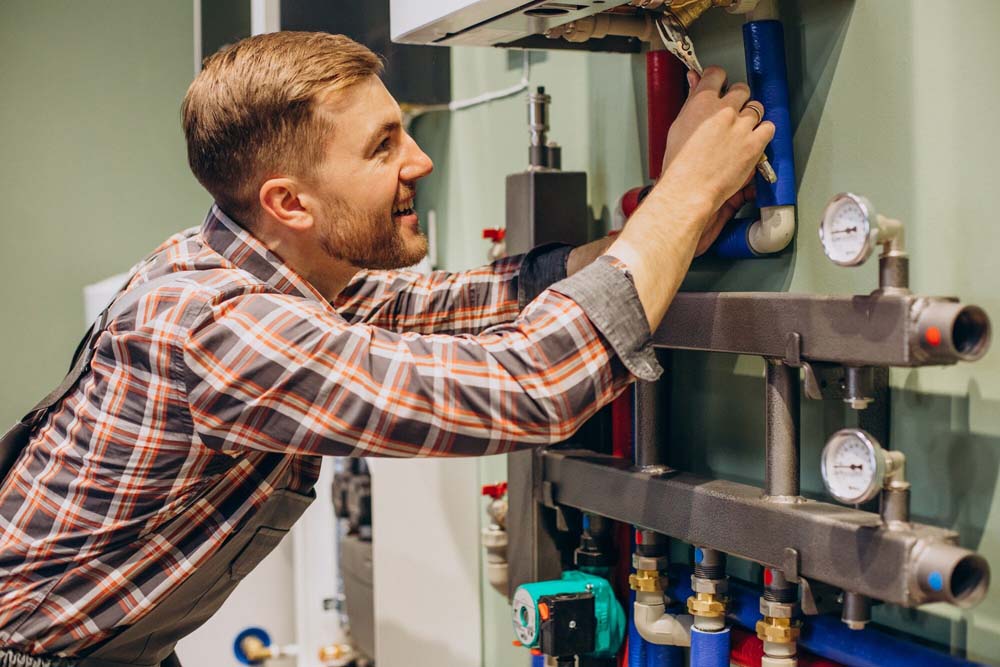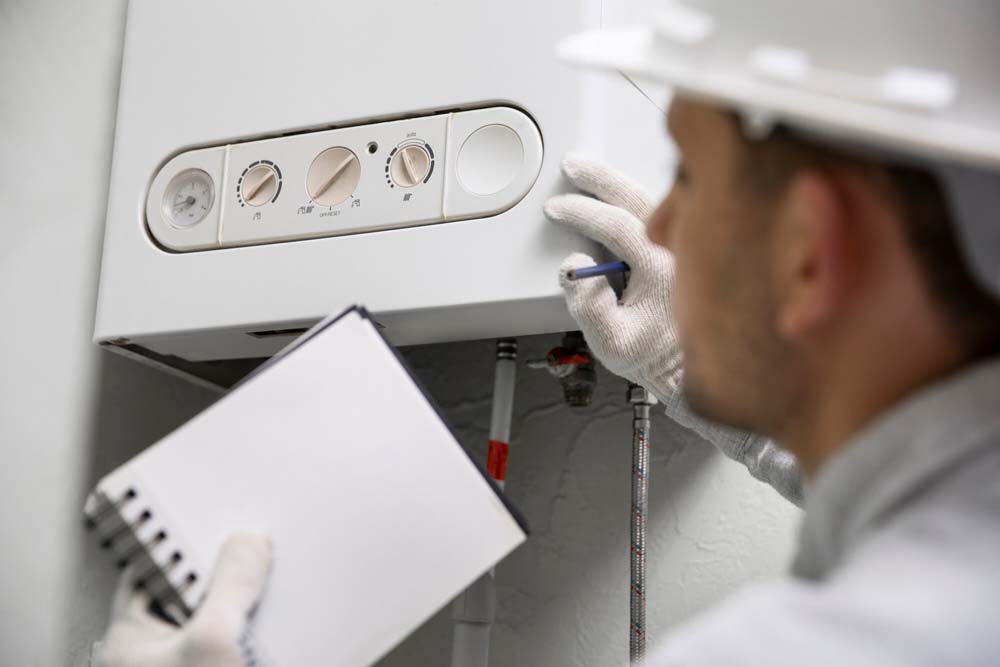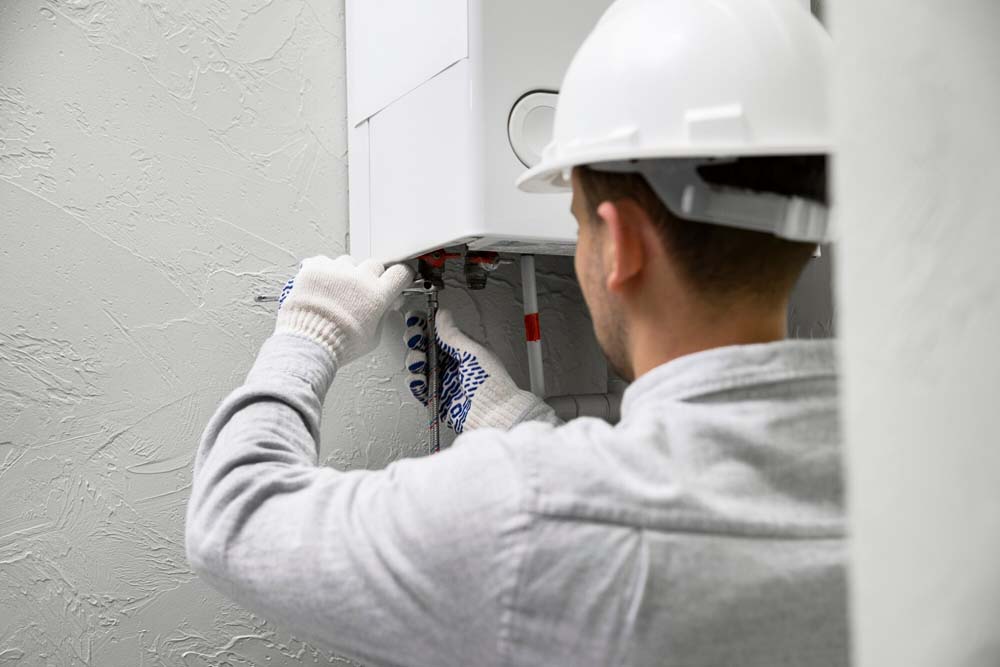Table of Contents
Key Takeaways
6 Signs It’s Time to Get a Water Heater Replacement
Risks From a Water Heater Gone Bad
Benefits of Water Heater Replacement
Frequently Asked Questions
Key Takeaways
- Water heaters have a lifespan, typically 8-12 years for tank types and up to 20 years for tankless models. Age is a primary indicator when considering a water heater replacement.
- Appearance of rusty water or rust around the inlet valve suggests internal corrosion, signaling the need for water heater replacement.
- Leaks from a water heater can cause extensive damage and are often a sign that the unit needs water heater replacement.
- Fluctuating water temperatures can indicate sediment buildup or failing components, necessitating a replacement.
- Sounds like popping or rumbling from a water heater are signs of sediment buildup or metal fatigue, and may require professional assessment and possible replacement.
- A rise in energy bills can be attributed to an inefficient, aging water heater.
- A failing water heater poses risks like water damage, electrical hazards, and overheating, which can be mitigated by timely replacement.
- New water heaters offer better energy efficiency, reliability, safety features, and can handle higher demands for hot water.
Water heaters are an essential part of your home, providing the hot water needed for showers, washing dishes, and doing laundry. But like any appliance, they don’t last forever. Recognizing the signs that you might need a water heater replacement can save you from unexpected cold showers and potential damage to your home. In this article, we’ll explore the key indicators that suggest it’s time to consider replacing your water heater. Understanding these signs can help ensure your home continues to run smoothly and efficiently.
6 Signs It’s Time to Get a Water Heater Replacement
1. Age of Your Water Heater
One of the most straightforward indicators that you might need a water heater replacement is the age of your unit. Most traditional tank water heaters have a lifespan of about 8 to 12 years, while tankless water heaters can last up to 20 years if maintained properly. To check the age of your water heater, look for the manufacturer’s label on the unit, which typically includes the installation date. If your water heater is approaching or has surpassed its expected lifespan, it’s wise to start considering a replacement.
Old water heaters can pose several risks. Efficiency tends to decrease as the unit ages, meaning it uses more energy to heat water, which can lead to higher utility bills. Additionally, older tanks are more prone to leaks and ruptures, which can cause significant water damage to your home. If you notice your aging water heater is not performing as well as it used to, it might be time to replace it to avoid these potential problems.
2. Rusty Water or Heater Inlet Valve
If you start to notice rusty water coming from your hot water taps, it could be a sign that your water heater is rusting away on the inside, and it might be time for a water heater replacement. Rust can also appear around the water heater’s inlet valve, indicating that the integrity of the tank has been compromised. When rust is visible, it’s a clear sign that the water heater is nearing the end of its useful life.
Rusty water is not just a plumbing issue—it can also impact your health. Studies show that the metals found when ingesting rusty water can result in health issues like shortness of breath and development of several types of cancers.
Additionally, using rusty water for bathing, cooking, or cleaning can pose health risks and stain your sinks, tubs, and clothing. From an aesthetic standpoint, it’s unpleasant and can make your water fixtures look old and dirty.
Often, the presence of rust indicates that the internal condition of the water heater is deteriorating. While some components like the anode rod can be replaced to extend the life of the tank temporarily, when rust has become extensive, replacement is usually a more cost-effective and safer solution than repair. Replacing a water heater ensures clean, safe water and can improve the overall energy efficiency of your home heating system.

3. Water Heater Leaks
Dealing with leaks in your water heater can be a nuisance and may indicate deeper issues that require immediate attention. Identifying and addressing these leaks early is crucial in preventing extensive damage to your home and might even necessitate considering a water heater replacement.
How to Identify Signs of Leaking in Your Water Heater
- Regular Inspections: Check the area around your water heater frequently for any unusual moisture or water. Regular checks can help catch leaks early.
- Visual Signs: Look for puddles, drips, or any water pooling on the floor directly beneath the tank. This is often the most obvious indicator of a leak.
- Corrosion and Stains: Inspect the tank for signs of corrosion or rust. Water stains or rust marks on the tank often indicate a slow, persistent leak.
Causes and Potential Damages of Water Heater Leaks
- Corrosion: Over time, the minerals in water can corrode the steel of the tank, leading to rust and leaks.
- Loose Connections: Check for any loose inlet or outlet connections, as these can also be sources of leaks.
- Aging Tank: As water heaters age, their structural integrity can decline, making leaks more likely.
- Potential Damages:
- Water Damage: Ongoing leaks can damage floors, walls, and even the foundation of your home.
- Mold and Mildew: Moist environments from leaks are ideal for mold and mildew growth, which can pose health risks.
- Structural Damage: Prolonged exposure to water can weaken structural components, leading to costly repairs.
Immediate Actions to Take if a Leak is Detected
- Turn Off Power Supply: Immediately shut off the power to the water heater. For electric heaters, turn off the electricity at the breaker. For gas heaters, turn off the gas valve.
- Shut Off Water Supply: Close the water valve leading to the water heater to stop more water from entering the tank and worsening the leak.
- Call a Professional: Contact a licensed plumber to assess whether a repair or a full water heater replacement is needed. Quick professional intervention can mitigate the damage and help restore normal operations.
4. Inconsistent Water Temperature
Inconsistent water temperatures can be caused by sediment buildup in the tank, faulty heating elements, or a malfunctioning thermostat. Sediment buildup occurs when minerals from hard water accumulate at the bottom of the tank, acting as a barrier between the water and the heating element, which reduces efficiency and can cause temperature fluctuations.
Fluctuating water temperatures are not just annoying—they can also increase your energy bills as the water heater struggles to maintain the desired temperature. On a comfort level, imagine expecting a hot shower only to be greeted with cold water, or worse, scalding hot water that suddenly turns cold.
If adjusting the thermostat doesn’t resolve the temperature issues, and you’ve had your unit for a number of years, it might be time for a water heater replacement. Consistent temperature issues often suggest that the water heater is no longer able to operate effectively and may be nearing the end of its useful life.
5. Unusual Noises from the Tank
A healthy water heater operates quietly. However, if you start hearing popping, rumbling, or cracking sounds, it’s a sign that something’s amiss. These noises typically occur due to sediment buildup heating up and exploding tiny bubbles, or the metal of the tank contracting and expanding.
What These Noises Can Indicate About the Water Heater’s Condition
- Sediment Impact: Sediment acts as a barrier between the burner and the water, causing the heater to work harder, which can reduce its efficiency and lifespan.
- Risk of Overheating: Excessive sediment can cause overheating, which stresses the water heater and increases the risk of damage or failure.
- Potential for Leaks: The constant expansion and contraction can weaken the metal, potentially leading to cracks and leaks over time.
Guidance on When to Consult a Professional
- When to Act: Persistent and unusual noises from your water heater are a clear sign that professional help is needed.
- Professional Assessment: A qualified technician can inspect the water heater to determine if the sediment can be flushed out effectively or if it’s better to proceed with a water heater replacement.
- Preventive Measures: Regular maintenance, such as annual flushing of the tank, can help reduce sediment buildup and extend the life of your water heater. However, if noises persist despite maintenance, it’s crucial to consult a professional to assess the need for replacing the water heater to ensure ongoing efficiency and safety.
6. Increased Energy Bills
An old water heater doesn’t work as efficiently as it once did. Over time, sediment builds up in the tank, making it harder for the unit to heat water. This means it has to run longer to reach the desired temperature, using more energy and costing you more money. If you notice your energy bills creeping up without a clear reason, it might be time to consider water heater replacement. Replacing an inefficient model with a new one can help maintain energy costs and prevent them from skyrocketing.
Keep track of your monthly energy bills to see if there’s a consistent increase in your costs. Comparing current bills with those from the same month in previous years can give you a clue about your water heater’s performance. If your energy use has increased significantly, and you haven’t changed your daily habits, your water heater might be the culprit. This is a clear sign that you might need a water heater replacement soon.
Risks From a Water Heater Gone Bad
Addressing these risks through timely maintenance and considering water heater replacement when necessary ensures your home remains safe and functional. Replacing a water heater proactively can mitigate the risks associated with an aging or faulty unit.
Water Damage
- A failing water heater can leak or burst, causing significant water damage to floors, walls, and belongings.
- The moisture can lead to mold growth, posing health risks and requiring costly remediation.
- Preventing such damage often necessitates water heater replacement before catastrophic failure occurs.
Electrical Hazards
- Electric water heaters involve electrical components that can create hazards if they malfunction.
- Issues such as faulty wiring or improper installations can lead to shocks or electrocution.
- Replacing a water heater with electrical faults is critical for safety, and installations should always be handled by professionals.
Overheating
- If the thermostat malfunctions, it may heat water to dangerously high temperatures.
- Overheated water can cause scalding injuries during everyday activities like showering or washing dishes.
- Regular maintenance and, if necessary, replacing a water heater can prevent these risks by ensuring proper temperature control.
Blocked Valves
- Water heaters have valves that control water flow and pressure; if these become blocked, it can be dangerous.
- Blocked valves can lead to increased pressure in the water heater, risking tank rupture or explosion.
- It’s crucial to replace a water heater if there are persistent issues with valves or pressure to ensure safety and proper functionality.
Benefits of Water Heater Replacement
Upgrading your home with a new water heater brings multiple benefits that enhance both comfort and safety while potentially lowering household costs. Here’s how a water heater replacement can be advantageous:
1. Energy Efficiency
- Reduced Energy Costs: Modern water heaters are built to be more energy-efficient than their predecessors. They feature advanced insulation, efficient heating elements, and smarter temperature controls that help minimize energy usage.
- Eco-friendly Operation: By consuming less energy, these newer models contribute to a smaller carbon footprint, aligning with eco-friendly home practices.
2. Consistent Hot Water Supply
- Reliable Performance: A new water heater provides a reliable and consistent supply of hot water, ensuring that your daily needs—from showers to dishwashing—are met without interruption.
- Increased Capacity: If your household has grown or your water usage has increased, replacing your old water heater with a larger or more effective model ensures that hot water is always available when needed.
3. Enhanced Safety Features
- Modern Safety Measures: New water heaters come equipped with improved safety features such as enhanced temperature controls, pressure relief valves, and automatic shutoff mechanisms to prevent overheating and high-pressure hazards.
- Leak Prevention: Advanced leak detection systems and better construction materials reduce the risk of leaks and water damage, safeguarding your home against potential emergencies.
4. Long-term Savings
- Durability: Newer models are designed to last longer and operate more efficiently, reducing the need for frequent repairs and ultimately extending the lifespan of the unit.
- Warranty and Support: Most new water heaters come with substantial warranties and customer support, providing peace of mind and protection for your investment.

Frequently Asked Questions
What factors should I consider when deciding between repair and replacement?
When deciding between repairing or replacing your water heater, consider the age of the unit, the cost of repairs, and whether your current model meets your household’s water heating needs. If repairs are frequent and costly, or if your water heater is over 10 years old, replacement might be the more economical and reliable choice.
How does water quality affect water heater longevity and performance?
Hard water, which is high in minerals like calcium and magnesium, can lead to sediment buildup in your water heater. This buildup can decrease efficiency and increase the risk of damage. Installing a water softener or regularly flushing the tank can mitigate these effects and prolong the life of your unit.
Are tankless water heaters a better option for replacement?
Tankless water heaters provide hot water on demand and are more energy-efficient than traditional tank models. They occupy less space and can reduce energy consumption by 30% to 50%. If your household’s hot water needs align with these benefits, a tankless model could be an excellent choice for water heater replacement.
What advancements in water heater technology can benefit homeowners today?
Recent advancements in water heater technology include Wi-Fi-enabled models that allow for remote monitoring and control, as well as hybrid models that combine traditional and heat pump technologies. These innovations offer improved efficiency, greater convenience, and better environmental performance, making them attractive options for water heater replacement.
Upgrade Your Comfort: Choose L&P Plumbing for Expert Water Heater Replacement
L&P Plumbing is your go-to expert for reliable, efficient water heater replacement services in Torrington, CT. With years of experience and a commitment to quality, L&P Plumbing ensures that your new water heater is installed professionally and functions optimally to meet your needs.
Choosing L&P Plumbing means accessing top-quality service, expert advice, and competitive pricing. We prioritize customer satisfaction and are dedicated to providing timely and practical solutions to all your plumbing issues, including water heater replacement.
Don’t let an old or inefficient water heater inconvenience you any longer. Contact L&P Plumbing today to explore your options for a new, energy-efficient water heater replacement. Trust us to deliver not just warmth and comfort to your home, but also peace of mind knowing you have the best team on the job.

